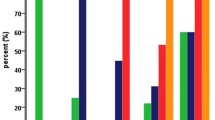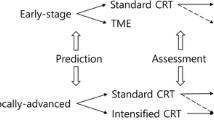Abstract
Purpose
Neoadjuvant chemoradiotherapy has now become a standard treatment for rectal cancer. Recently, attempts have been made to predict the response rate to this treatment to decide whether or not it must be performed. However, tissue factors for predicting the response rate is not cohesively reviewed.
Methods
Eighty-three patients with rectal cancer, all under neoadjuvant chemoradiotherapy and subsequent surgery, were examined for tissue factors in the biopsy sample. The tissue factors examined include tumor differentiation grade, lymphovascular invasion, perineural invasion, pathological stage, and lymphocytic infiltration. Lymphocytic infiltration was investigated by immunohistochemistry for CD8 T lymphocyte in biopsy samples.
Results
In this study, tissue factors were found to play a decisive role in predicting response to neoadjuvant treatment. The most important factor was the pathological stage, which has the highest correlation with response to treatment. There is a significant relationship between CD8 lymphocyte infiltration and response to treatment (P value = 0.018). Primary perineural invasion and lymphovascular invasion also have a significant meaningful relationship with response to treatment (P value = 0.021 and P value = 0.036).
Conclusion
In this study, it was determined that the investigated factors have a significant relationship with response to treatment and could be used to predict the response to treatment, and if a low possibility of positive response exists, prevention of the complications of neoadjuvant chemoradiotherapy for the patients could occur.
Similar content being viewed by others
Data Availability
Data will be available on request.
References
Conde-Muíño R, Cuadros M, Zambudio N, Segura-Jiménez I, Cano C, Palma P. Predictive biomarkers to chemoradiation in locally advanced rectal cancer. Biomed Res Int. 2015;2015:921435–10. https://doi.org/10.1155/2015/921435.
Patel SA, Ryan DP, Hong TS. Combined modality therapy for rectal cancer. Cancer J. 2016;22(3):211–7.
Yoon WH, Kim HJ, Kim CH, Joo JK, Kim YJ, Kim HR. Oncologic impact of pathologic response on clinical outcome after preoperative chemoradiotherapy in locally advanced rectal cancer. Annals of Surgical Treatment and Research. 2015;88(1):15–20.
Palma P, Conde-Muíño R, Rodriguez-Fernandez A, Segura-Jiménez I, Sánchez-Sánchez R, Martín-Cano J, et al. The value of metabolic imaging to predict tumor response after chemoradiation in locally advanced rectal cancer. Radiation Oncology. 2010;15(5):119.
Chun-Ming H, Ming-Yii H, Cheng-Jen M, Yung-Sung Y, Hsiang-Lin T, Ching-Wen H, et al. Neoadjuvant FOLFOX chemotherapy combined with radiotherapy followed by radical resection in patients with locally advanced colon cancer. RadiatOncol. 2017;12:48. https://doi.org/10.1186/s13014-017-0790-3.
Müller MF, Ibrahim AEK, Arends MJ. Molecular pathological classification of colorectal cancer. Virchows Arch. 2016;469:125–34.
Hav M, Libbrecht L, Ferdinande L, Geboes K, Pattyn P, Cuvelier CA. Pathologic assessment of rectal carcinoma after neoadjuvant radio(chemo)therapy: prognostic implications. Biomed Res Int. 2015;2015:574540–11. https://doi.org/10.1155/2015/574540.
Marley AR, Nan H. Epidemiology of colorectal cancer. Int J Mol Epidemiol Genet. 2016;7(3):105–14.
MalekZadeh M, Alahyari S, Sandoughdaran S, Zham H. Epidemiology of neuroendocrine tumors in an Iranian population. Arch Iran Med. 2017;20(10):652–4.
Li Y, Wang J, Ma X, Tan L, Yan Y, Xue C, et al. A review of neoadjuvant chemoradiotherapy for locally advanced rectal xancer. Int J Biol Sci. 2016;12(8):1022–31.
Franke AJ, Parekh H, Starr JS, Starr JS, Tan SA, Iqbal A, et al. Total neoadjuvant therapy: a shifting paradigm in locally advanced rectal cancer management. Clin Colorectal Cancer. 2018;17(1):1–12.
Kapiteijn E, Marijnen CAM, Nagtegaal ID, Putter H, Steup WH, Wiggers T, et al. Preoperative radiotherapy combined with total mesorectal excision for resectable rectal cancer. N Engl J Med. 2001;345(9):638–46.
Li Q, Meng X, Liang L, Xu Y, Cai G, Cai S. High preoperative serum globulin in rectal cancer treated with neoadjunctive chemoradiation therapy is a risk factor for poor outcome. Am J Cancer Res. 2015;5(9):2856–64.
Jalilian M, Davis S, Mohebbi M, Sugamaran B, Porter IW, Bell S, et al. Pathologic response to neoadjuvant treatment in locally advanced rectal cancer and impact on outcome. J Gastrointest Oncol. 2016;7(4):603–8.
QuahH M, Chou JF, Gonen M, Shia J, Schrag D, Saltz LB, et al. Pathologic stage is most prognostic of disease-free survival in locally advanced rectal cancer patients after preoperative chemoradiation. Cancer. 2008;113(1):57–64.
Compton CC, Fielding LP, Burgart LJ, Conley B, Cooper HS, Hamilton SR, et al. Prognostic factors in colorectal cancer. College of American Pathologists Consensus Statement 1999. Archives of Pathology & Laboratory Medicine. 2000;124(7):979–94.
Zeng WG, Liang JW, Wang Z, Zhang XM, Hu JJ, Hou HR, et al. Clinical parameters predicting pathologic complete response following neoadjuvant chemoradiotherapy for rectal cancer. Chin J Cancer. 2015;34:41. https://doi.org/10.1186/s40880-015-0033-7.
Peng J, Sheng W, Huang D, Venook AP, Xu Y, Guan Z, et al. Perineural invasion in pT3N0 rectal cancer: the incidence and its prognostic effect. Cancer. 2011;117(7):1415–21.
Kim CH, Yeom SS, Lee SY, Kim HR, Kim YJ, Lee KH, et al. Prognostic impact of perineural invasion in rectal cancer after neoadjuvant chemoradiotherapy. World J Surg. 2019;43(1):260–72.
Dhadda AS, Bessell EM, Scholefield J, Dickinson P, Zaitoun AM. Mandard tumor regression grade, perineural invasion, circumferential resection margin and post-chemoradiation nodal status strongly predict outcome in locally advanced rectal cancer treated with preoperative chemoradiotherapy. Clin Oncol (R Coll Radiol). 2014;26(4):197–202.
Cienfuegos JA, Rotellar F, Baixauli J, Beorlegui C, Sola JJ, Arbea L, et al. Impact of perineural and lymphovascular invasion on oncological outcomes in rectal cancer treated with neoadjuvant chemoradiotherapy and surgery. Ann Surg Oncol. 2015;22(3):916–23.
Yasuda K, Nirei T, Sunami E, Nagawa H, Kitayama J. Density of CD4 (+) and CD8(+) T lymphocytes in biopsy samples can be a predictor of pathological response to chemoradiotherapy (CRT) for rectal cancer. Radiat Oncol. 2011;6:49. https://doi.org/10.1186/1748-717X-6-49.
Schollbach J, Kircher S, Wiegering A, Seyfried F, Klein I, Rosenwald A, et al. Prognostic value of tumor-infiltrating CD8+ lymphocytes in rectal cancer after neoadjuvant chemoradiation: is indoleamine-2,3-dioxygenase (IDO1) a friend or foe. Cancer Immunol Immunother. 2019;68(4):563–75. https://doi.org/10.1007/s00262-019-02306-y.
Matsutani S, Shibutani M, Maeda K, Nagahara H, Fukuoka T, Nakao S, et al. Significance of tumor-infiltrating lymphocytes before and after neoadjuvant therapy for rectal cancer. Cancer Sci. 2018;109(4):966–79. https://doi.org/10.1111/cas.13542.
Teng F, Mu D, Meng X, Kong L, Zhu H, Liu S, et al. Tumor infiltrating lymphocytes (TILs) before and after neoadjuvant chemoradiotherapy and its clinical utility for rectal cancer. Am J Cancer Res. 2015;5(6):2064–74.
Pagès F, Kirilovsky A, Mlecnik B, Asslaber M, Tosolini M, Bindea G, et al. In situ cytotoxic and memory T cells predict outcome in patients with early-stage colorectal cancer. J Clin Oncol. 2009;27(35):5944–51.
Letaief F, Nasri M, Ayadi M, Meddeb K, Mokrani A, Yahyaoui Y, et al. Potential predictive factors for pathologic complete response after the neoadjuvant treatment of rectal adenocarcinoma: a single center experience. Cancer Biol Med. 2017;14(3):327–34.
Ceelen W, Fierens K, Van Nieuwenhove Y, Pattyn P. Preoperative chemoradiation versus radiation alone for stage II and III resectable rectal cancer: a systematic review and meta-analysis. Int J Cancer. 2009;124:2966–72.
Braendengen M, Tveit KM, Berglund A, Birkemeyer E, Frykholm G, Påhlman L, et al. Randomized phase III study comparing preoperative radiotherapy with chemoradiotherapy in nonresectable rectal cancer. J Clin Oncol. 2008;26:3687–94.
Bosset JF, Collette L, Calais G, Mineur L, Maingon P, Radosevic-Jelic L, et al. Chemotherapy with preoperative radiotherapy in rectal cancer. N Engl J Med. 2006;355:1114–23.
Acknowledgments
We acknowledge the work of Dr. Mohamadreza Rouhi in collecting patients’ data.
Author information
Authors and Affiliations
Contributions
Mona Malekzadeh Moghani: Conceptualization, methodology, validation, resources, writing (review and editing), supervision, project administration. Sam Alahyari: Conceptualization, methodology, software, investigation, writing (original draft). Afshin Moradi: Methodology, validation, investigation, writing (review and editing), resources, supervision. Malihe Nasiri: Software, validation, formal analysis.
Corresponding author
Ethics declarations
Conflict of Interest
The authors declare that they have no conflict of interest.
Research Involving Human Participants and/or Animals
All procedures performed in studies involving human participants were in accordance with the ethical standards of Shahid Beheshti University of Medical Sciences research committee and with the 1964 Helsinki declaration and its later amendments or comparable ethical standards.
Informed Consent
Informed consent was obtained from all individual participants included in the study.
Additional information
Publisher’s Note
Springer Nature remains neutral with regard to jurisdictional claims in published maps and institutional affiliations.
Rights and permissions
About this article
Cite this article
Malekzadeh Moghani, M., Alahyari, S., Moradi, A. et al. Pathological Predictors of Response to Neoadjuvant Treatment in Rectal Carcinoma. J Gastrointest Canc 52, 690–695 (2021). https://doi.org/10.1007/s12029-020-00450-8
Published:
Issue Date:
DOI: https://doi.org/10.1007/s12029-020-00450-8




